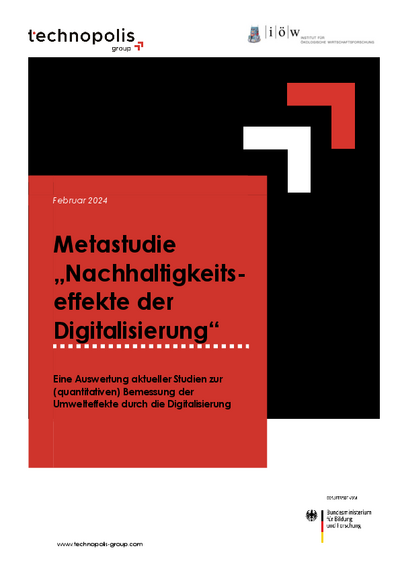Meta study “Sustainability Effects from Digitalization” Overview on available studies and critical assessment of the state of research, structured by topics, sectors and fields of application
The green and digital transformation of the economy, the so-called twin transition, has advanced in recent years to become a central political priority for the future. The digital transformation has the potential to save energy and resources through optimized process controls and smart applications, while generating wealth through sustainable business models. It could thus help Germany achieve its ambitious sustainability and climate targets. However, there are fears that digitalization could run counter to the goals of the green transformation, for example, due to the ecological footprint of digital technologies.
Against this background, the German Federal Ministry of Education and Research (BMBF) has commissioned the Technopolis Group and the Institute for Ecological Economy Research (IÖW) to conduct a meta study of the sustainability effects of digitalization. The aim of this project is to assess the state of research on such effects and to systematically compile and critically classify studies, arguments, and data. The meta study undertakes a holistic assessment of the potential of the digital transformation and takes into account both the direct environmental effects of digital applications (production, use, disposal of devices) and indirect effects (e.g., technical optimization, substitution, rebound and systemic effects).
The meta study is oriented to the topics of "climate protection and adaptation," "energy systems," "circular economy," "resource use," "sustainable business," "urban development and mobility," "research infrastructure," as well as "primary production and biotechnological processes”. In work package 1 of the study, the international study situation on the sustainability effects of digitalization is systematically recorded. In work package 2, an assessment of the most relevant studies is carried out with the aim of determining the state of research in the aforementioned topic areas. In work package 3, research gaps are identified and recommendations for the development of a research agenda by the BMBF will be developed on this basis. Methodologically, a literature analysis, expert interviews and qualitative data analyses will be used.




